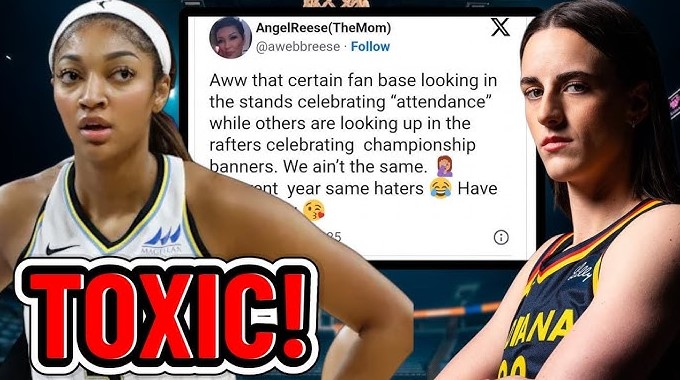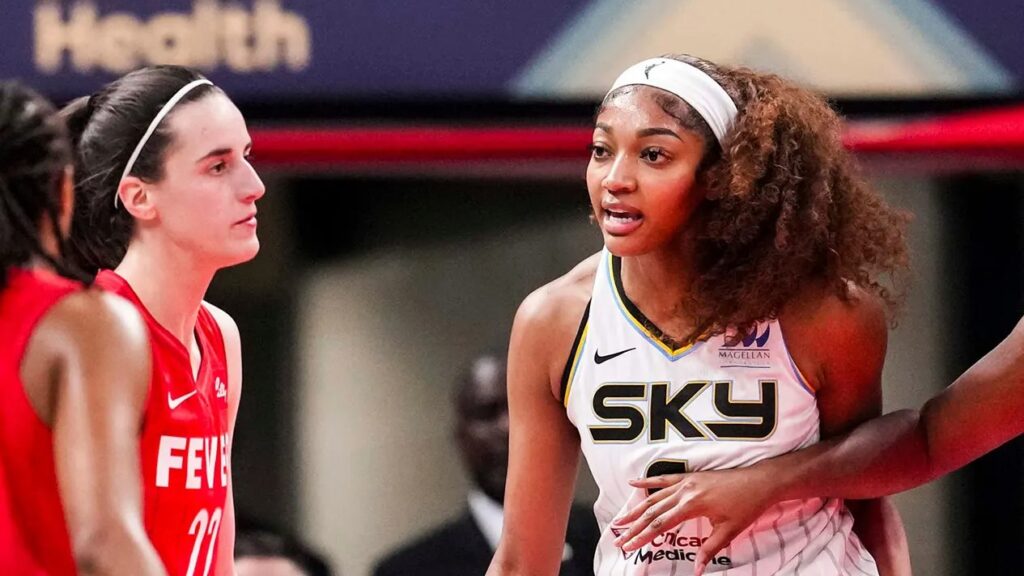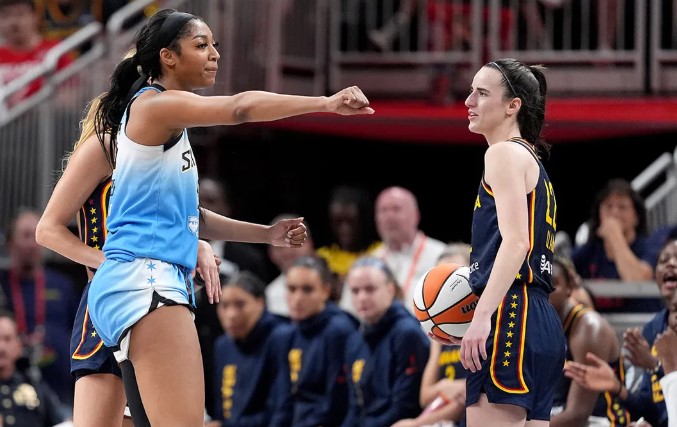WNBA Shaken to Its Core: Angel Reese’s Explosive Racism Allegations Against Indiana Fever and Caitlin Clark Send Shockwaves Through Professional Women’s Basketball
The Women’s National Basketball Association finds itself embroiled in unprecedented controversy following Angel Reese’s emotionally charged accusations of systematic racism and disrespect, allegations that have fundamentally challenged the league’s reputation as a progressive organization committed to equality and social justice. The Chicago Sky forward’s tearful interview has not only ignited fierce debates across social media platforms but has also forced uncomfortable conversations about racial dynamics within professional women’s basketball, particularly regarding how Black athletes are treated compared to their white counterparts in terms of recognition, respect, and promotional opportunities.

Reese’s devastating claims center around what she perceives as institutionalized discrimination that has plagued her career since entering the spotlight, with particular emphasis on her treatment by the Indiana Fever organization and the broader league’s apparent preference for promoting certain players over others based on racial considerations. Her assertion that “they don’t respect me because I’m Black” represents more than just personal frustration; it embodies a systemic critique of how the WNBA operates behind its public facade of inclusivity and progressive values, suggesting that the league’s commitment to equality may be more performative than substantive when it comes to actual player treatment and career advancement opportunities.
The emotional weight of Reese’s accusations becomes even more profound when considering her accomplished career trajectory and the barriers she has overcome to reach elite professional status, making her claims particularly damaging to the league’s carefully constructed image as a beacon of female empowerment and racial progress in professional sports. Her visible distress during the interview, marked by uncontrollable sobbing and voice trembling with pain, demonstrates the psychological toll that perceived discrimination has taken on one of the league’s most prominent young stars, raising serious questions about the mental health support systems available to players who feel marginalized within their own professional environment.
The rivalry between Angel Reese and Caitlin Clark, which initially seemed like a healthy competitive dynamic that could elevate both players’ profiles and benefit the entire league, has now transformed into a lightning rod for discussions about racial bias in sports media coverage and fan reception. Reese’s frustration with what she perceives as disproportionate attention and positive coverage given to Clark reflects broader concerns within the Black athletic community about how white athletes often receive more favorable treatment from media outlets, corporate sponsors, and fan bases, even when their Black counterparts demonstrate equal or superior performance levels on the court.

The five words that have become the rallying cry for Reese’s supporters – “They don’t respect me, period” – encapsulate decades of frustration experienced by Black female athletes who feel their contributions to professional sports are consistently undervalued, undermined, or overshadowed by narratives that favor their white teammates and competitors. These words have resonated deeply within the African American community and among advocates for racial justice in sports, who see Reese’s courage in speaking out as a necessary step toward addressing longstanding inequities that have been allowed to persist unchallenged for far too long in professional athletic organizations.
The WNBA’s response to these allegations will likely determine not only Angel Reese’s future relationship with the league but also the organization’s credibility as a champion of social justice and equality in professional sports. League officials face the challenging task of addressing these serious accusations while maintaining relationships with all stakeholders, including players, fans, sponsors, and media partners who have varying perspectives on the validity and implications of Reese’s claims about systematic discrimination within the organization’s structure and culture.
Veteran players like A’ja Wilson and Tina Charles have stepped forward to support Reese’s right to voice her concerns, emphasizing that her allegations should be taken seriously and investigated thoroughly rather than dismissed or minimized as personal grievances or competitive jealousy. Their support lends credibility to Reese’s claims and suggests that racial bias within the WNBA may be more widespread than previously acknowledged, potentially affecting multiple players who have chosen to remain silent about their experiences rather than risk career consequences for speaking out against perceived discrimination.

The potential retirement of Angel Reese, one of the league’s most dynamic and marketable young talents, would represent a devastating loss for the WNBA both competitively and commercially, particularly if her departure is directly attributed to racial discrimination and the league’s failure to address her concerns adequately. Such an outcome would not only deprive fans of witnessing her continued athletic development but would also send a chilling message to other players who might be experiencing similar treatment, potentially creating a culture of silence that allows discriminatory practices to continue unchecked throughout the organization.
As the basketball world awaits the WNBA’s official response to these explosive allegations, the controversy has already succeeded in forcing uncomfortable but necessary conversations about race, respect, and equality in professional women’s sports, conversations that may ultimately lead to meaningful reforms if the league demonstrates genuine commitment to addressing the systemic issues that Angel Reese has courageously brought to light. The outcome of this situation will likely serve as a defining moment for the WNBA’s future direction and its ability to live up to its stated values of inclusivity, equality, and respect for all athletes regardless of their racial or ethnic background.